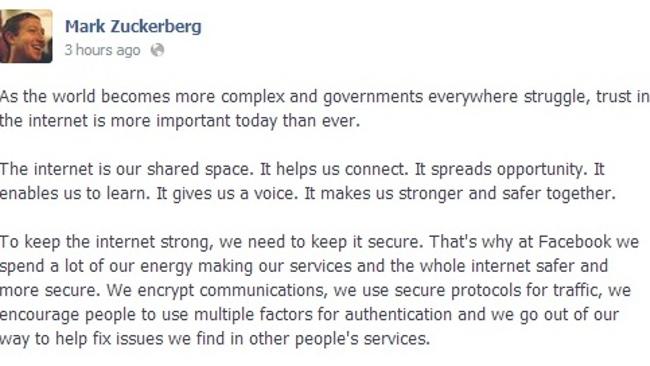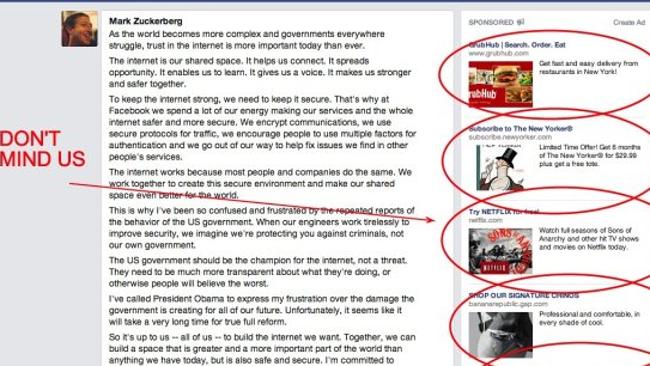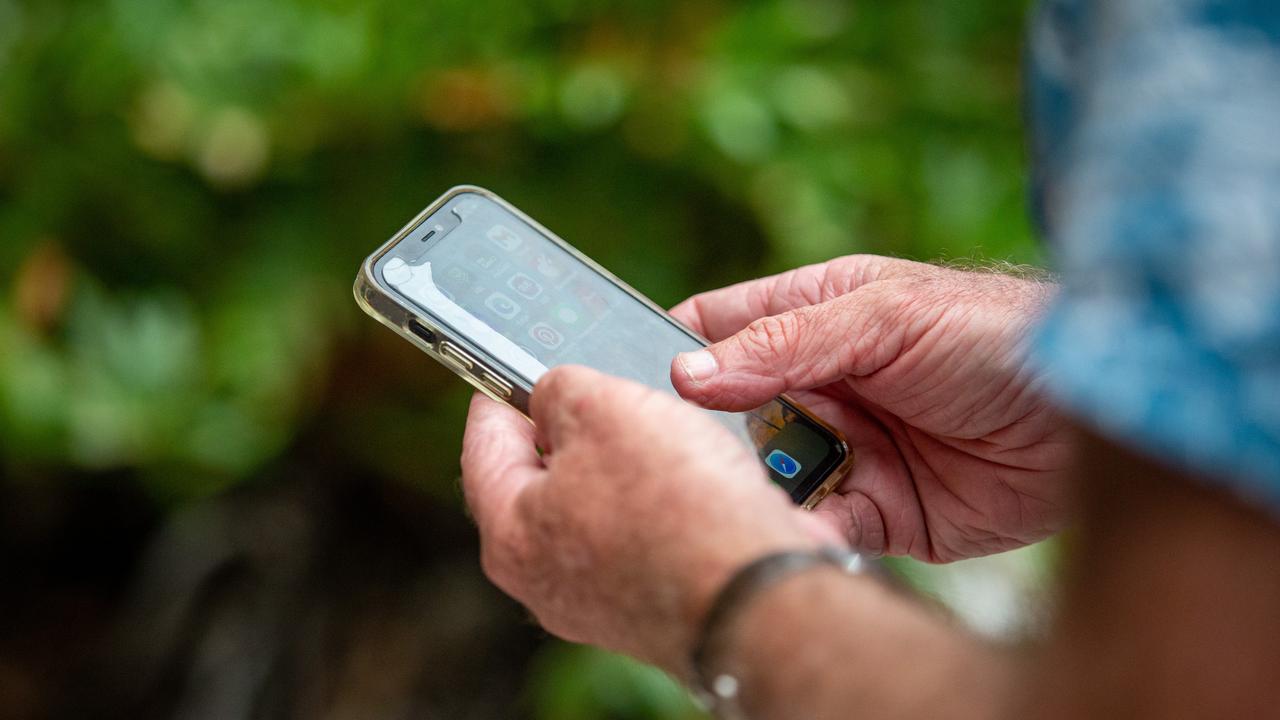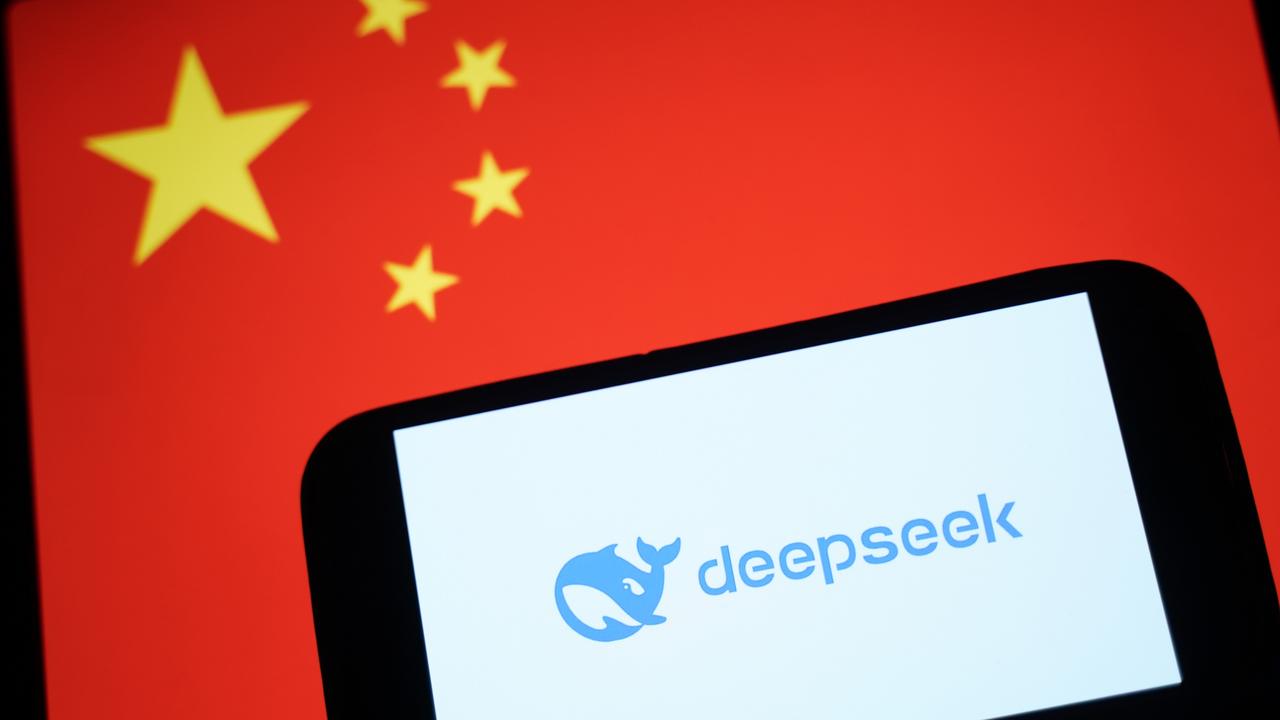Zuckerberg phones Obama over NSA surveillance concerns
FACEBOOK head honcho Mark Zuckerberg has called the US President to unleash his frustrations. But there’s more than a little hypocrisy on display.
MARK Zuckerberg says he has called President Barack Obama to express his frustration over the US government’s surveillance programs, but has failed to see the glaring hypocrisy by doing so.
Posting on his Facebook page Thursday, Zuckerberg wrote that he’s been “confused and frustrated by the repeated reports of the behaviour of the U.S. government. When our engineers work tirelessly to improve security, we imagine we’re protecting you against criminals, not our own government.”

Though Zuckerberg does not name the National Security Agency, the post comes a day after the news site Intercept reported that the agency has impersonated a Facebook server to infect surveillance targets’ computers and get files from a hard drive. The report is based on documents leaked by former NSA contractor Edward Snowden.
“The U.S. government should be the champion for the internet, not a threat. They need to be much more transparent about what they’re doing, or otherwise people will believe the worst,” Zuckerberg wrote and added that, unfortunately, “it seems like it will take a very long time for true full reform.”
Of course, Facebook’s own history of privacy problems suggests it is perfectly able to erode people’s trust all on its own. Throughout its existence, privacy advocates have lashed out against the giant social network for using unsuspecting people’s information for its own financial gain — namely, serving up targeted ads based on users’ expressed interests.
In fact, you can see such targeted ads just to the right of Zuckerberg’s letter:

Technology companies including Facebook, Google Inc., Microsoft Corp., have been increasingly vocal about frustrations over the U.S. government’s spying programs. Last month, top executives from the companies, along with others from Yahoo, Twitter, AOL and LinkedIn, called for changes that would include a government agreement not to collect bulk data from internet communications.
In January, Obama ordered a series of changes to mass surveillance programs that included ending the government’s control of phone data from hundreds of millions of Americans.
The President also commanded intelligence agencies to get a court’s permission before accessing such records. Tech companies took the president’s speech as a step in the right direction, but said that more is needed to protect people’s privacy.
Zuckerberg’s full post below:
“As the world becomes more complex and governments everywhere struggle, trust in the internet is more important today than ever.
The internet is our shared space. It helps us connect. It spreads opportunity. It enables us to learn. It gives us a voice. It makes us stronger and safer together.
To keep the internet strong, we need to keep it secure. That’s why at Facebook we spend a lot of our energy making our services and the whole internet safer and more secure. We encrypt communications, we use secure protocols for traffic, we encourage people to use multiple factors for authentication and we go out of our way to help fix issues we find in other people’s services.
The internet works because most people and companies do the same. We work together to create this secure environment and make our shared space even better for the world.
This is why I’ve been so confused and frustrated by the repeated reports of the behaviour of the US government. When our engineers work tirelessly to improve security, we imagine we’re protecting you against criminals, not our own government.
The US government should be the champion for the internet, not a threat. They need to be much more transparent about what they’re doing, or otherwise people will believe the worst.
I’ve called President Obama to express my frustration over the damage the government is creating for all of our future. Unfortunately, it seems like it will take a very long time for true full reform.
So it’s up to us — all of us — to build the internet we want. Together, we can build a space that is greater and a more important part of the world than anything we have today, but is also safe and secure. I’m committed to seeing this happen, and you can count on Facebook to do our part.”



